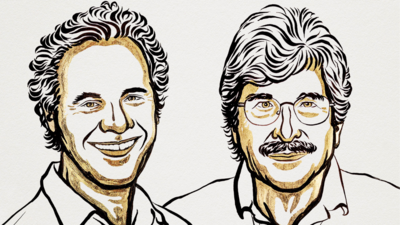- News
- World News
- Europe News
- 2024 Nobel prize: Victor Ambros, Gary Ruvkun receive Physiology/Medicine award for discovery of microRNA
Trending
2024 Nobel prize: Victor Ambros, Gary Ruvkun receive Physiology/Medicine award for discovery of microRNA

"This year's NobelPrize in Physiology or Medicine honours two scientists for their discovery of a fundamental principle governing how gene activity is regulated. They discovered microRNA, a new class of tiny RNA molecules that play a crucial role in gene regulation," Sweden's Karolinska Institute said on Monday during the announcement ceremony.
Victor Ambros and Gary Ruvkun’s groundbreaking discovery revealed a completely new principle of gene regulation that turned out to be essential for multicellular organisms, including humans.
Understanding the regulation of gene activity has been an important goal for many decades. If gene regulation goes awry, it can lead to serious diseases such as cancer, diabetes, or autoimmunity.
The information stored within our chromosomes can be likened to an instruction manual for all cells in our body. Every cell contains the same chromosomes, so every cell contains exactly the same set of genes and exactly the same set of instructions. Yet, different cell types, such as muscle and nerve cells, have very distinct characteristics. How do these differences arise? The answer lies in gene regulation, which allows each cell to select only the relevant instructions. This ensures that only the correct set of genes is active in each cell type.
All about the Nobel prize in physiology/medicine
Alfred Nobel had an active interest in medical research and the Physiology/Medicine award was the third prize area the inventor mentioned in his will.
- A total of 114 Nobel Prizes in Physiology or Medicine have been awarded since 1901; over 227 individuals have received the award between 1901-2023. Of the 227 individuals awarded the
Nobel Prize in Physiology or Medicine, 13 are women. - The prize was not awarded on nine occasions: in 1915, 1916, 1917, 1918, 1921, 1925, 1940, 1941 and 1942.
- Why were the medicine prizes not awarded in those years? In the statutes of the Nobel Foundation it says: "If none of the works under consideration is found to be of the importance indicated in the first paragraph, the prize money shall be reserved until the following year. If, even then, the prize cannot be awarded, the amount shall be added to the Foundation’s restricted funds." During World War I and II, fewer Nobel Prizes were awarded.
- The youngest recipient of the prize was 31-year old Frederick G. Banting in 1923. He was recognised for the discovery of insulin.
- The oldest recipient was 87-year-old Peyton Rous in 1966 for his discovery of tumour-inducing viruses.
- No one has been awarded the Nobel Prize in Physiology or Medicine more than once.
- India-born Har Gobind Khorana shared the Nobel Prize in Physiology or Medicine with Robert Holley and Marshall W. Nirenberg in 1968 for his role in deciphering genetic code. Khorana was born in Raipur and later became an American citizen.

The Nobel Prize medal in physiology and medicine was designed by Swedish sculptor and engraver Erik Lindberg and represents the Genius of Medicine holding an open book in her lap, collecting the water pouring out from a rock in order to quench a sick girl’s thirst.
What is the Nobel prize?
The Nobel prizes, arguably the world's most prestigious awards, will be announced throughout this week.
The prizes, with 11 million Swedish crowns (about $1 million) each, are also given for achievements in physics (October 8), chemistry (October 9), literature (October 10), and peace (October 11). The Nobel prize for economics will be announced on October 14.

The Nobel Prize was created by wealthy Swedish inventor Alfred Nobel, who in his will dictated that his estate should be used to fund "prizes to those who, during the preceding year, have conferred the greatest benefit to humankind."
Nobel died in 1895 but it took until 1901, following fighting over his will, before the first awards.
Nobel named the Royal Swedish Academy of Sciences to award the prizes for chemistry and physics, the Swedish Academy for literature, Sweden's Karolinska Institute medical university for physiology or medicine, and the Norwegian parliament for peace.
The Nobel prizes are presented to the laureates on December 10, the anniversary of Nobel's death.
End of Article
FOLLOW US ON SOCIAL MEDIA











